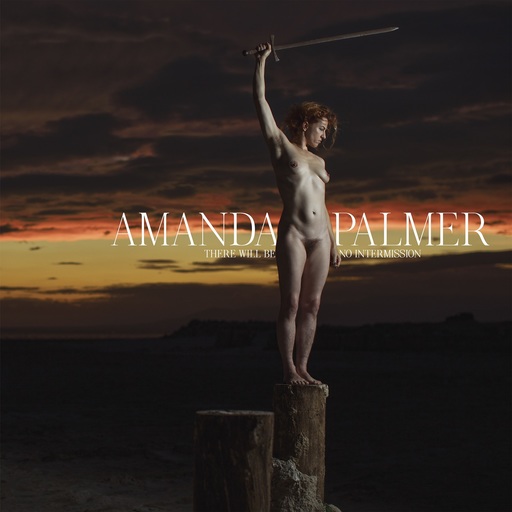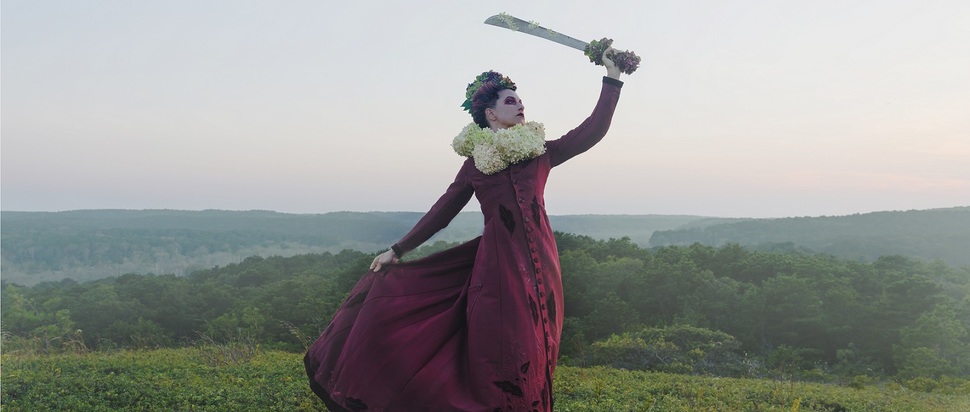Trials and Tribulations: Amanda Palmer on There Will Be No Intermission
Ahead of the release of her third solo record There Will Be No Intermission, we speak to Amanda Palmer about the pain, loss and tragedy of the last seven years
"I can already tell that you’re going to title your article '10 ways that Amanda Palmer tells you you can save the world with art'."
We’re moaning about the state of the world, and journalism today, though Amanda Palmer – calling from her house in upstate New York – has always had an interesting relationship with the media. From controversially ditching her record label Roadrunner (a rock-focused division of the Warner Music Group) in 2010, to making Kickstarter history in 2012 by crowdfunding her second solo album, Theatre Is Evil, to the tune of $1.2 million (the most a musical project had, at the time, ever grossed), the former frontwoman of The Dresden Dolls has ruffled feathers left and right. But she’s always stayed true to her art.
"I am not and probably never will be an enigmatic artist, it’s just not the way I do the job," she says. "And I judge no other artists for keeping a wider berth and distance from their audiences. I’ve become so sure in myself, especially with [my new] record, that even though nasty criticism hurts because I’m human, I don’t really need anyone’s validation anymore."
Unlike other musicians backed by the multifaceted machines of major labels, Palmer controls almost every aspect of her artistic career. She effectively does multiple jobs, switching from musician, to businesswoman, to marketer, to tour planner, to mother ("That’s my unpaid side-hustle!"). "I don’t mean to complain, I actually really like it that way. I like that this job is absolutely different every single day – it’s why I picked it."
A staunch proponent of connecting directly with her audience and asking for support (as explored in her viral TED talk and, later, her bestselling 2014 book The Art of Asking), Palmer now resides on Patreon. For the uninitiated, it’s a bit like Kickstarter, but with a membership model where fans can subscribe to particular artists to unlock regular and special content.
Leaving Roadrunner was a defiant move against the more commercial and impersonal mechanisms of music creation and distribution. She was tired of doing the "media-friendly dog and pony show every two years in order to be taken seriously as an artist". In her crowdfunded model, she focuses on sharing regular songs, videos, photos and other fragments of personal content, and was "overjoyed when I started to crank up my Patreon and thought I would never have to release another album again".
But in the seven years since Theatre Is Evil, she’s been through a lot. There was no grand plan to write 'the next album', but stories and songs emerged organically from a turbulent period of her life. (To coldly summarise: two abortions, one miscarriage, the birth of her first child, the deaths of two very close friends and the suicide of an ex.)
"At a certain point I knew that there was a record. And then I thought, 'Oh fuck, okay, well it’s not really my place to decide what wants to happen here," she says. "The material just took the driver’s seat, and I got into the passenger’s seat and tried to navigate it where it wanted to go." As she wryly summarises in the album’s beautiful companion book (even while in The Dresden Dolls, she has created a partner book for every record thus far, much more in-depth than your average liner notes): "All of the pain and loss and tragedy of the last seven years would finally have a purpose. How fun and convenient!"
There Will Be No Intermission is Palmer’s third solo album, and the origin of its name is also explained in the book. During a gig in Gateshead, an audience member needed to go to the toilet – so Palmer issued an unplanned intermission (much to the venue’s surprise). While not quite as on-the-nose as The Saddest Record in the World, its working title, There Will Be No Intermission hits on a few themes: the un-pause-ability of real life, the impassive timing of tragedy, but also Palmer’s own defiance against assumed conventions (there is, of course, an intermission on the album – and in the book).
After the more layered and 'band' records before this (Theatre Is Evil and her debut Who Killed Amanda Palmer?), it’s also her "first real solo record," she argues: "This is really the first time that I’ve stood up completely vulnerably and naked," she explains, "without the power of a band or an orchestra or a bunch of arrangements to decorate my songwriting." Fittingly, she stands literally naked on the album cover, sword in hand against a foreboding sunset.

And it’s an engrossing piano record, cinematic in its pacing, understated in its production as well as vulnerable in its writing. As explained in depth in the book ("I just fucking love context"), there's a poignant and often heartbreaking background to each track. The death of Anthony Martignetti, Palmer’s closest friend and mentor (who lives on in her son’s name Ash, "short-for-Anthony"), features prominently. As do the child she had and the ones she didn’t; it’s very much a 'birth, life and death' record.
Recent seismic sociopolitical shifts – not least of all #MeToo – have informed the album, too. Voicemail for Jill is inspired by the tidal result of Ireland’s Repeal the 8th movement in 2018. The vote effectively legalised abortion, but also pulled into sharp relief the increasingly ossified and retrograde views on female reproductive autonomy in her home country. At the time of our call, Bernie Sanders had just announced his plans to run for president in 2020. We ask if that gives her anything resembling hope. "I’m pretty excited that he’s running, but I’m equally excited that there’s a whole field of female candidates," she says. "Honestly, anyone but Trump. Vagina or no vagina, anyone but Trump."
Palmer’s own philosophy of unabashed honesty seems suddenly vital in today’s volatile era of reckoning. As she writes in the book, "There is real political power in telling your personal truth." And it’s through the honesty of thousands of women that the movement of #MeToo became an avalanche.
"Everything that’s happened in the last five years, in the landscape of reality against which I have been living my own personal trials and tribulations, has practically ripped the door off my house and screamed inside that I need to come out and tell the truth," she says. "From climate change to Trump, to the most intimate moments of my reproductive drama, it really feels like this is a moment right now on Earth where – if you are not hearing the call to stand up and simply tell the truth, and break through this massive barrier of bullshit which we have all been suffering – you’re not awake right now."
Palmer doesn’t so much wear her heart on her sleeve as have it dangling from her fingertips, bloodily soaking her piano keys, ukulele strings and Tweeting keypad with honesty. She sees art as a form of therapy; as she says in the album’s press release, "Loss and death kept happening in real-time, and these songs became my therapeutic arsenal of tools for making sense of it all."
We play devil’s advocate and ask about the role of suffering in art, and if truly great suffering is needed to create 'good' art? "Trauma and suffering is always relative, and there just isn’t a human being out there who isn’t dealing with suffering at some level. It’s just baked in to our lives," she says. "I don’t think you need to have a certain amount of certified suffering in order to be a great artist. What you do need is the capacity to hold and examine whatever degree of trauma and suffering you do have and express it with authenticity. And it doesn’t fucking matter how big it is."
She cites noted psychiatrist (and Holocaust survivor) Viktor Frankl, who in Man’s Search For Meaning (1946) writes, "a man’s suffering is similar to the behaviour of a gas. If a certain quantity of gas is pumped into an empty chamber, it will fill the chamber completely and evenly, no matter how big the chamber. Thus suffering completely fills the human soul and conscious mind, no matter whether the suffering is great or little."
"I don’t think you need to 'suffer' to be an artist," Palmer concludes. "If you’re a human being you’re fucking suffering anyway. And then if you want to examine and reflect on that suffering for your fellow tribespeople, then congratulations, you’re an artist."
There Will Be No Intermission is released on 8 Mar via Cooking Vinyl; Amanda Palmer plays Carnegie Hall, Dunfermline, 1 Nov; City Halls, Glasgow, 2 Nov
